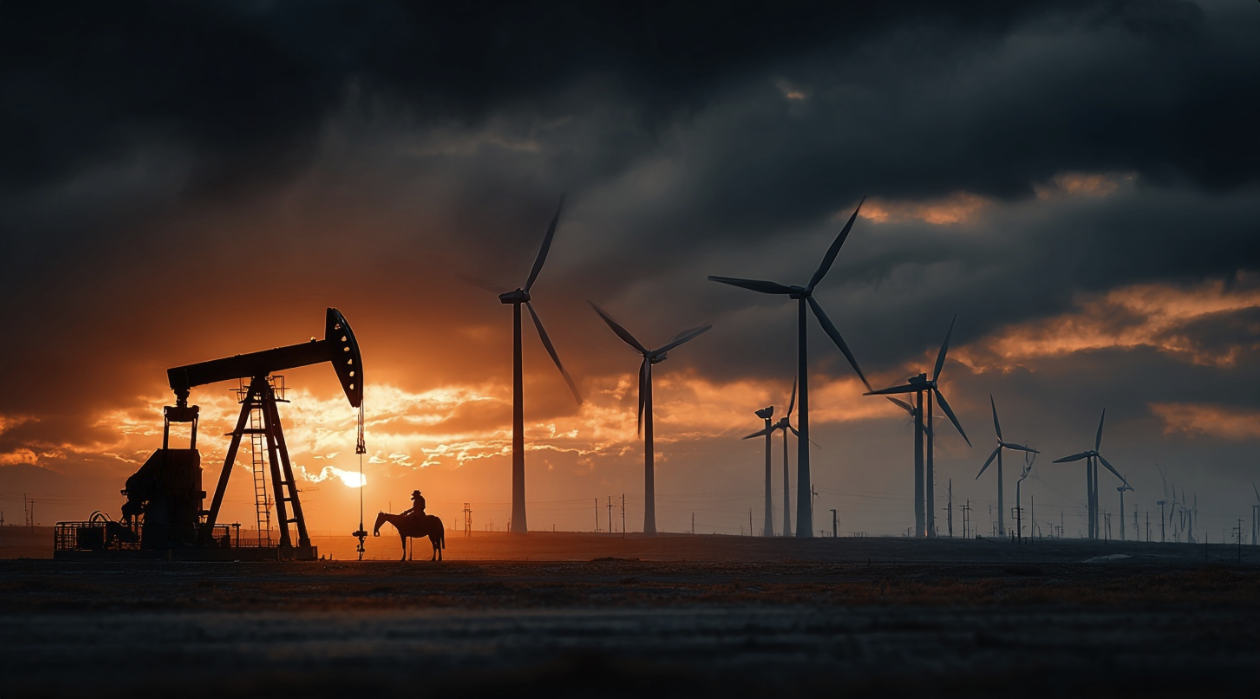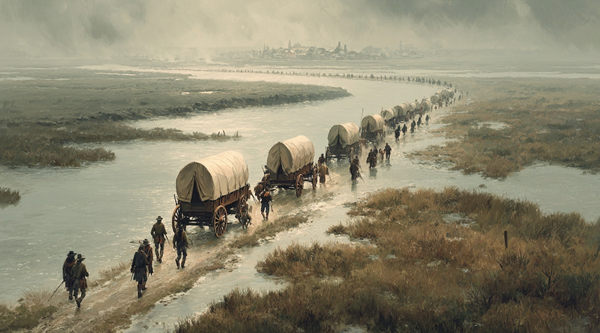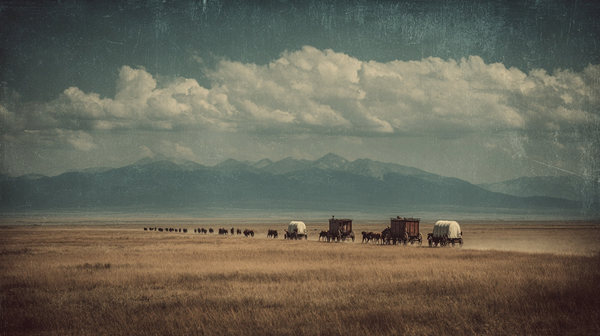Frontier Justice and Fossil Fuel Fantasies: Deconstructing Taylor Sheridan's Conservative Mythology in Landman

On a November morning in 2024, a 90-second clip from Paramount+'s Landman detonated across conservative social media. Billy Bob Thornton's character, crisis manager Tommy Norris, stands before a wind farm and delivers what sounds like a devastating takedown of renewable energy: "In its 20-year lifespan, it won't offset the carbon footprint of making it." The post on X amassed 21.6 million views. RedState writer Bonchie declared, "Every left-winger should have their eyes held open and be forced to watch this on repeat until it sinks in."

There was only one problem: nearly everything Tommy says in that scene is demonstrably false.
Peer-reviewed research published in Environmental Science & Technology analyzing 4,161 wind turbines found an average carbon payback time of 5.3 months—not two decades. A 2024 study in the Journal of the Royal Society of New Zealand documented a 176-megawatt wind farm recouping its energy costs in six months. Stanford professor Mark Z. Jacobson, director of the university's Atmosphere/Energy program, told Newsweek that even 15 years ago, wind turbines achieved energy payback in 1.6 to 4.3 months, making them "98.8 to 99.6 percent carbon-free" over their lifetime.
Yet Landman never invites its audience to question Tommy's claims. The scene doesn't end with a rebuttal or counter-evidence. The lawyer he's lecturing—a stand-in for coastal elites—simply absorbs the speech. Tommy gets the last word, as he always does. And 35 million global viewers watched Season One absorb his mythology as truth.
This is Taylor Sheridan's conservatism in microcosm: a sophisticated packaging of right-wing talking points as folksy, anti-establishment wisdom, delivered by charismatic actors playing men who work with their hands and distrust anyone with advanced degrees. As France's Le Monde observed in January 2025, Sheridan has become "the 'in-house' showrunner for Paramount whose content and form align particularly well with Trumpism." Understanding why requires excavating the ideological architecture beneath Landman's entertaining surface—and recognizing how European left-wing critics see it as part of a broader transatlantic phenomenon.

Deconstructing the "Anti-Elite" Myth
The central irony of Landman is that its ostensible heroes are themselves the elite. Jon Hamm's Monty Miller runs M-Tex Oil, commanding enough capital to casually invest $300 million in a speculative drilling venture. Tommy Norris negotiates seven-figure land deals, maintains connections with Mexican drug cartels, and orchestrates corporate cover-ups. These men fly private, dine at steakhouses, and wield more institutional power than any tenured professor or "big-city lawyer" they disdain.
Yet Sheridan's dialogue consistently positions them as working-class underdogs fighting against an out-of-touch establishment. The show's pilot introduces Tommy tied to a chair by cartel members, pitching them on an oil lease through sheer force of personality and "facts and figures"—a scene that establishes him as a clever everyman who can talk his way out of anything. When his son Cooper orders a latte at a roadside bikini coffee stand, the roughnecks mock him mercilessly while honking trucks pile up behind them. The message is clear: lattes are effete coastal signifiers; real men drink black coffee.
This performative class identification runs throughout Sheridan's work. In Yellowstone, the Dutton family—which owns a ranch the size of Rhode Island valued at hundreds of millions—constantly frames itself as defending a "way of life" against encroaching liberals, developers, and government regulators. As patriarch John Dutton proclaims in Season Four: "I am the opposite of progress. I'm the wall it bashes against and I will not be the one who breaks." It's a line Le Monde identified as encapsulating the entire Sheridan universe: reactionary resistance dressed up as principled traditionalism.
What makes this ideology potent is that it addresses real anxieties. The American working and middle classes have indeed seen their economic security erode over four decades of neoliberal policy. Manufacturing jobs have vanished. Small towns have hollowed out. The social contract has frayed. Sheridan taps into legitimate grievance—but redirects it away from structural analysis and toward culture war scapegoats.
The wind turbine scene exemplifies this misdirection. Tommy's monologue blames renewable energy advocates for hypocrisy, suggesting their solutions are worse than the problems they address. He invokes the concrete in turbine foundations, the diesel used in construction, the steel in the structure. It sounds specific and damning. But as University of Edinburgh professor Alasdair McDonald explained to Newsweek, a medium-size wind turbine requires about 103,206 gallons of diesel equivalent in primary energy—while generating energy worth 3.6 million gallons of diesel equivalent over 20 years. The payback ratio is overwhelming, yet Tommy presents the initial cost as if it invalidates the entire enterprise.
This rhetorical technique mirrors broader conservative climate denial: focus on the imperfections of green technology while ignoring the catastrophic externalities of fossil fuels. Tommy never mentions that oil and gas companies spend millions lobbying against fuel efficiency regulations, or that ExxonMobil's own lobbyist admitted in a 2021 undercover recording: "Did we aggressively fight against some of the science? Yes." Instead, he deploys what the show presents as common-sense skepticism—the kind of straight talk that urban elites allegedly can't handle.
The show's Aaron Sorkin-style speechifying reinforces this dynamic. Sorkin's characters in The West Wing won debates through eloquence and moral clarity; Sheridan's characters win through contempt and assertion. When Tommy lectures the attorney Rebecca Falcone about wind farms, he punctuates his points with obscenities and dismissiveness. The scene positions his anger as authentic working-class truth-telling, her college-educated expertise as naive book learning. That millions of viewers internalized his falsehoods as revelations speaks to how effectively the scene weaponizes anti-intellectual resentment.
Comparative Transatlantic Populism
European left-wing observers watching Landman recognize a familiar pattern. The show's "I am the opposite of progress" ethos echoes slogans from Marine Le Pen's Rassemblement National ("We are the people"), Giorgia Meloni's Fratelli d'Italia ("God, homeland, family"), and the Brexit campaign's "Take Back Control." These movements share a master frame: positioning themselves as defenders of tradition against an abstract, cosmopolitan elite that has betrayed "the people."
Sheridan's frontier mythology offers the American variant of this ideology. Where European right-wing populism invokes blood-and-soil nationalism rooted in ethnicity and religion, Sheridan's West Texas is a secular frontier where individual grit supposedly still matters. The Permian Basin becomes a space outside modern regulatory constraints—a place where men can still punch high school quarterbacks who sleep with their daughters without legal consequences, where OSHA violations are just the cost of doing business, where Mexican cartels are part of the landscape rather than evidence of failed drug policy.
This American exceptionalism distinguishes Sheridan's populism from European variants, but the structural logic is identical: romanticize an imagined past, position educated coastal elites as the primary threat, and frame progressive policy as civilizational decline. Landman does this through genre—the neo-western provides ready-made imagery of rugged individualism and natural resource extraction as manifest destiny. European right-wing movements lack such convenient cultural mythology, relying instead on explicit nationalism and immigration panic.
Yet both approaches serve capital's interests while claiming to oppose elite control. As New Republic critic Kate Aronoff observed, "Landman is in love with the myths that oilmen tell about themselves"—myths that obscure how thoroughly the fossil fuel industry has captured regulatory agencies, corrupted political systems, and delayed climate action through calculated disinformation campaigns. The American Petroleum Institute, funded by M-Tex's real-world counterparts, runs ads during Landman streams insisting that oil companies are good corporate citizens. The irony is thick enough to drill through.
The transatlantic parallel extends to how these movements use folk authenticity as a shield against fact-checking. When Tommy delivers his wind turbine diatribe, he grounds it in physical labor: "Do you have any idea how much diesel they have to burn to mix that much concrete?" The invocation of concrete-mixing, crane operation, and lubricant maintenance signals working-class knowledge. This rhetorical move mirrors how Nigel Farage in Britain or Matteo Salvini in Italy deploy colloquial speech and working-class signifiers to inoculate themselves against expert correction. "I'm just asking questions" becomes "I'm just telling you how things really work in the field."
Le Monde's January 2025 analysis positioned Sheridan as the cultural avatar of Trump's America for this exact reason. The newspaper noted that Yellowstone was "long seen as appealing to a Republican audience, one that watches Fox News rather than HBO." By 2025, Sheridan's Paramount+ empire—which includes Landman, Mayor of Kingstown, Tulsa King, and multiple Yellowstone prequels—had become the streaming equivalent of Fox's prime-time lineup: entertainment that validates conservative viewers' worldview while maintaining plausible deniability about explicit political messaging.
European critics, observing from outside American culture war trenches, see this more clearly than many U.S. commentators. They recognize Sheridan's work as part of the same cultural ecosystem that produced Trump rallies where supporters chant "Drill, baby, drill" while the candidate delivers rambling speeches about windmills causing cancer (a claim FactCheck.org debunked in 2019). The content differs across contexts, but the formula remains: weaponize nostalgia, validate grievance, direct anger at scapegoats rather than structures.
Left-Wing Strategic Response
The left's challenge with Landman mirrors its broader populism problem: how to acknowledge legitimate working-class concerns while rejecting reactionary solutions. Simply dismissing Sheridan's audience—35 million global viewers for Season One, making Landman Paramount+'s most-watched original ever—as dupes or deplorables guarantees political irrelevance. Yet uncritically accepting the show's framing cedes ideological ground on climate policy, gender relations, and labor politics.
The first imperative is analytical precision. When Tommy claims wind turbines take 20 years to offset their carbon footprint, the left must respond with specific data: Stanford research showing 1.6-4.3 month payback, University of Delaware analysis confirming at most two years even with conservative estimates, and explanation of why the fossil fuel industry funds think tanks to propagate exactly these myths. This isn't pedantic fact-checking—it's exposing how capital manufactures doubt to preserve profit.
Equally crucial is addressing the underlying anxiety Landman exploits. The show's audience isn't wrong that the American economy has failed working people. They're wrong about why and what to do about it. When Monty Miller casually mentions that "private banks won't touch fossil fuels anymore" (itself misleading—Wall Street still heavily finances oil and gas), he's tapping into real fear about economic dislocation. The left must offer a compelling counter-narrative: that fossil fuel workers have been sacrificed not by environmentalists but by the same executives who fought unionization, lobbied for right-to-work laws, and prioritized shareholder returns over worker security.
This requires the left to move beyond defensive crouch. Instead of simply debunking Landman's claims, progressive voices should tell competing stories about the Permian Basin: the workers sickened by petrochemical exposure, the communities whose water has been contaminated by fracking, the Indigenous lands desecrated by pipelines, the futures mortgaged by carbon emissions. These stories are at least as dramatic as Sheridan's—but they require institutional support for documentarians, showrunners, and writers who can match his production values and narrative craft.
The gender politics present another opening. Multiple critics have documented how Landman treats women as objects—lingering camera shots on Ali Larter's body, running gags about teenage daughter Ainsley (17 on-screen, played by 27-year-old Michelle Randolph) doing yoga in revealing clothing while her father's lawyer roommate gawks. Larter herself told Entertainment Weekly she embraces the sexualization: "Objectify me... I've waited my whole career to have a role where I am complex and full and well-developed." This defense—agency through objectification—deserves serious engagement rather than dismissal.
But it also illuminates how thoroughly Landman has absorbed patriarchal logic. The show can only imagine women's power as sexual allure or maternal warmth. There are no female engineers, no women in management, no depiction of the actual gender dynamics in contemporary oil fields where women increasingly work in technical and supervisory roles. By limiting women to wives, daughters, and lawyers (who exist primarily to be lectured), Sheridan perpetuates the frontier myth that extractive industries are "men's work"—which serves to exclude women from the industry's substantial wages and benefits.
The left's response must highlight this exclusion as part of the same structure that denies all workers collective power. The Texas oil industry's historic hostility to unions, its reliance on contractor labor without benefits, its normalization of dangerous working conditions—these aren't bugs but features of the system Landman romanticizes. When Cooper Norris (Tommy's son) witnesses a fatal rig explosion in Episode One, the show presents it as tragic but inevitable. A left-wing counter-narrative would ask: Why is this acceptable? Who profits from this danger? What would democratic worker control look like?
Crucially, this critique must avoid the condescension that drives working-class voters toward right-wing populism. Landman is genuinely entertaining television. Billy Bob Thornton delivers a magnetic performance. The show gets procedural details of land acquisition and well operation right often enough to feel authentic. Recognizing its appeal isn't capitulation—it's strategic realism.
The Slate critic Tyler Austin Harper, writing about Yellowstone in 2023, argued that Sheridan's politics are "left and right and American"—that his shows contain genuine progressive elements (indigenous rights storylines, critique of capitalist development) alongside reactionary ones. This both-sides framing is itself ideological, obscuring how Sheridan's progressive gestures serve to legitimize his conservative core message. But Harper is correct that Sheridan's audience isn't monolithic. Many watch for the family drama, the landscape cinematography, the industrial procedural elements—not explicitly for ideology.
This creates an opening. The left shouldn't demand that viewers reject Landman wholesale, but rather encourage critical viewing. What would it mean to watch the show while asking: Why does Tommy's wind turbine speech include no counter-argument? Why do we never hear from workers who've been injured in preventable accidents? Why are women's storylines overwhelmingly about their relationships to men? Cultivating this critical consciousness matters more than winning arguments about whether Landman is "good" or "bad" television.
Conclusion: Entertainment as Ideological Battlefield
Landman's 35 million viewers aren't watching political propaganda—they're watching soap opera, workplace procedural, and regional portraiture. But ideology operates most effectively when it doesn't announce itself, when it feels like common sense rather than contested politics. Sheridan has mastered this: embedding reactionary assumptions in entertaining narratives that feel grounded in working-class experience.
The European left's recognition of Landman as "Trumpist" entertainment isn't cultural snobbery—it's pattern recognition. They've watched their own countries' entertainment industries struggle with right-wing populist capture (Poland's Law and Justice party attempted to control public broadcasting; Hungary's Orbán did succeed). They understand that cultural production shapes political possibility as much as policy papers do.
For the American left, Landman represents both challenge and opportunity. The challenge is that Sheridan commands resources and reach that few progressive creators can match—his reported $1 billion deal with NBCUniversal dwarfs any left-wing cultural production budget. The opportunity is that his success proves audiences hunger for stories about work, place, and economic precarity. These are potentially left-wing themes, hijacked by right-wing framing.
Reclaiming them requires more than fact-checking wind turbine payback times—though that remains necessary. It requires building alternative infrastructure for storytelling, supporting writers and showrunners who can dramatize working-class life without reactionary mythology, and fostering critical media literacy that helps audiences distinguish between authentic regional culture and ideological manipulation.
Most urgently, it requires the left to abandon its defensive crouch around working-class culture. Landman succeeds partly because it doesn't lecture its audience, doesn't signal superiority, doesn't substitute academic jargon for lived experience. A left that can match this narrative confidence—while telling true stories instead of mythological ones—might find Sheridan's audience more persuadable than conventional wisdom suggests.
The wind turbines keep turning in West Texas, offsetting their carbon in months rather than decades, quietly generating the energy that might help stabilize our climate. They'll still be there after Landman's Season Two finale, after the next viral clip, after Sheridan's next deal. The question is whether the left can tell their story as compellingly as Sheridan tells his myths. Right now, he's winning. That needn't be permanent.
This article draws on the following sources and references:
- Taylor Sheridan, showrunner darling of Trump's America
- Yellowstone' creator and Rogan scoff at modern liberal ideology demonizing work ethic, masculinity
- Yellowstone's Politics Are Left. And Right. And American.
- A Big TV Hit Is a Conservative Fantasy Liberals Should Watch
- Taylor Sheridan leaving Paramount over politics, Nicole Kidman drama
- Us v Them: the birth of populism
- Stanford University - Atmosphere/Energy Program
- International Energy Agency (2023)



